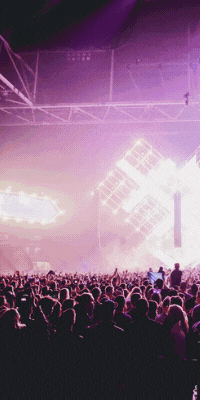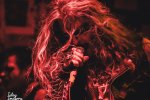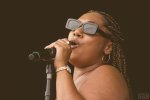Ria Hall - Interview with Ria Hall

Ria Hall is one of Aotearoa music's most respected mana wahine. On 28 February she marked an important milestone with the release of her stunning new album Manawa Wera. Inspired by Hall's own personal journey, as well as the current political climate across the globe, Manawa Wera is a collection of songs that speaks directly to her views, vision and experiences.
Chris Chick from Muzic.net.nz spoke to Ria about her new music, career highlights and the future:
Who is Ria Hall? And what brought her to the music scene?
Just a Maori girl who has been very fortunate to have made a career from doing what I love. I found my voice as a teenager and haven't stopped honing my craft since.
 As an artist, you have a distinct sound akin to the early reggae movement, is this something you chose because of the sound, or because it fits your message through your lyrics?
As an artist, you have a distinct sound akin to the early reggae movement, is this something you chose because of the sound, or because it fits your message through your lyrics?
Because of the style of reggae I was raised on and heard heaps growing up. The classics! Third World, Steel Pulse, UB40, Bob Marley and The Wailers, Jimmy Cliff - that kinda palette. I wanted to throw back to those days, as I'm so inspired by the more classic approach.
Your new single Owner, which was released on 18 January 2020, is the third single from your album Manawa Wera, what was the driving force behind this song?
The lyrics speak to the struggle between western ideology of ownership vs the indigenous world view, and also speaks to the need for humanity to strip back the layers where we tend to judge people on appearance, religion, skin colour - and instead, look into the qualities of people. It's a double pronged series of messaging but so important.
You have a massive Maori influence within your work, whether it is the album art or the use of Te Reo Maori. How important is this to you and what you do?
It's who I am. This is me as my most authentic truest form of self. I am a strong advocate for Maori culture and language, and what underpins Maori philosophies and perspective. I love how metaphoric the language and art is, it's what sets us apart from the rest of the world, and it's for the betterment of us all.
What has been some of the highlights of your career up until this point?
Honestly, having the ability to release work is always a highlight! This is my third album and I consider each time an absolute milestone. Collaborating with amazing artists over the years has been so rewarding as well, on all the levels.
 With your standing in the New Zealand music industry, do you take into account the influence you have on others when composing your music?
With your standing in the New Zealand music industry, do you take into account the influence you have on others when composing your music?
Yes. Which is why I try my best to speak and come from the most real view point. I only want to serve the realness!
What advice do you have for those looking to forge a career in music?
Stay strong in your beliefs and convictions. Whatever is true will shine through and put you in good stead!
From a philosophical standpoint, what is the motivation in your heart for this world?
Aroha. This is the place that we must operate from as humans in all our interactions.
If you could play any venue or arena around the world, where would that be?
I'd go back to New York in a heartbeat! Probably the Apollo Theatre. But that's purely for selfish reasons.
What does the future look like for Ria Hall?
To be honest - I have no idea! But I like that.
Thank you very much for taking the time to talk to us, and from everyone here at Muzic.net.nz, all the best for your future. We look we look forward to hearing what you have in store for us.
About Ria Hall

Born in Tauranga, Ria spent time in Auckland and Australia, before settling in Wellington and really finding her musical feet. She co-formed and fronted the reggae band Hope Road, who, in performing at the Parihaka International Peace Festival and Wellington's Waitangi Day One Love event, won the respect of Aotearoa's elite roots, reggae and soul music communities. This led to her joining Hollie Smith's live ensemble, becoming part of Eru Dangerspiel's psychedelic explosion, and, latterly, performing backing vocals for the 2010 reunion shows of the iconic TrinityRoots.
Her profile has also been lifted significantly by her inspired performance at the opening ceremony of Rugby World Cup 2011 – a performance witnessed by a televised audience of millions.
Visit the muzic.net.nz Profile for Ria Hall
Releases
Other Interviews By Chris Chick
 Interview: Flogging a Dead One Horse Town Celebrate their 10 Year Anniversary
Interview: Flogging a Dead One Horse Town Celebrate their 10 Year Anniversary
27 Nov 2020 // by Chris Chick
Flogging A Dead One Horse Town are celebrating 10 years together, Chris Chick from Muzic.net.
Read More...
 Interview with Madeleine Howard
Interview with Madeleine Howard
15 Sep 2020 // by Chris Chick
Right from a young age, pop artist Madeleine Howard has been influenced by New Zealand’s talented female musicians. Drawing inspiration from the likes of Brooke Fraser, Anika Moa and Bic Runga, Madeleine has worked hard to develop her own unique and undeniably distinctive Kiwi sound.
Read More...
 Interview with Horror Story - Celebrating 20 Years
Interview with Horror Story - Celebrating 20 Years
18 Aug 2020 // by Chris Chick
New Plymouth Punk-Rockers Horror Story are celebrating a milestone many can only dream of - 20 years. Ever since their first release Monsterpiece hit the airwaves in 2001, they have amassed an impressive 12 EP and album releases, infiltrated NZ's music TV, recorded a Misfits cover, featured in numerous compilations and achieved much, much more.
Read More...
 Interview: City Of Souls
Interview: City Of Souls
01 May 2020 // by Chris Chick
Auckland alt-rock outfit City Of Souls have dropped their mammoth 16 track debut album Synaesthesia. Chris Chick from Muzic.
Read More...
 Interview with Coridian
Interview with Coridian
17 Apr 2020 // by Chris Chick
In their own words, Coridian describe themselves in this way; "take fireball vocal powerhouse Dity and the hard hitting, harder grooving Raven brothers, bind them together and you get Coridian. It's the four-piece Auckland based who are fast becoming one of the best new names in Kiwi rock".
Read More...
 Interview: Foley
Interview: Foley
01 Apr 2020 // by Chris Chick
Foley (Ash Wallace & Gabriel Everett) have been riding the wave of excitement for the last two years as they added to their impressive backlog of gigs, which included the Rhythm and Vines festival, and gigs for their two single releases Settle and Talk About It. Chris Chick from Muzic.
Read More...
 Newsletter Interview: Lexytron
Newsletter Interview: Lexytron
18 Feb 2020 // by Chris Chick
Lexytron, the new alternative rock outfit have been working on their debut album here in NewZealand, Something Blue. Due to be released on all good streaming platforms on 20 March 2020, Something Blue crosses genres, flinging the dirt and danger of rock n roll against the bleeding heart and melody of Mozart.
Read More...
Most Viewed Artists
Latest Galleries
NZ Top 10 Singles
- APT.
ROSÉ And Bruno Mars - DIE WITH A SMILE
Lady Gaga And Bruno Mars - BIRDS OF A FEATHER
Billie Eilish - TASTE
Sabrina Carpenter - I LOVE YOU, I'M SORRY
Gracie Abrams - ESPRESSO
Sabrina Carpenter - SAILOR SONG
Gigi Perez - LOSE CONTROL
Teddy Swims - A BAR SONG (TIPSY)
Shaboozey - GOOD LUCK, BABE!
Chappell Roan











 Report A Problem
Report A Problem

